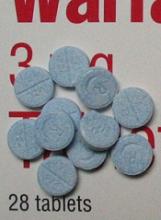A large study has revealed an association between stroke and “inadequate” anticoagulation among patients with atrial fibrillation.
More than 80% of the patients studied did not receive guideline-recommended anticoagulant therapy prior to having a stroke.
The study also showed that when patients did receive recommended anticoagulants, they had less severe stroke outcomes and a lower risk of death.
These findings were published in JAMA.
“Atrial fibrillation is very common, and people with the condition are at a much higher risk of having stroke,” said study author Ying Xian, MD, PhD, of the Duke University Medical Center in Durham, North Carolina.
“Treatment guidelines call for these patients to receive an anticoagulant such as warfarin at a therapeutic dose or a non-vitamin K antagonist oral anticoagulant (NOAC), so it’s surprising that this is not occurring in the vast majority of cases that occur in community settings.”
The study included 94,474 patients who had an acute ischemic stroke and known history of atrial fibrillation.
The patients were admitted from October 2012 through March 2015 to 1622 hospitals participating in the “Get with the Guidelines-Stroke” program, a national stroke registry sponsored by the American Heart Association and American Stroke Association.
In analyzing data from these patients, the researchers found the following:
- 83.6% of patients were not receiving therapeutic anticoagulation prior to stroke
- 30.3% were not receiving any antithrombotic treatment
- 39.9% were receiving antiplatelet therapy only
- 13.5% were receiving sub-therapeutic warfarin
- 7.6% were receiving therapeutic warfarin
- 8.8% were receiving NOACs.
“While some of these patients may have had reasons for not being anticoagulated, such as high bleeding or fall risk, more than two-thirds had no documented reason for receiving inadequate stroke prevention therapy,” Dr Xian said.
Dr Xian added that, in those cases where anticoagulation failed to prevent a stroke, patients who were on anticoagulant therapy tended to have less severe strokes, with less disability and death.
The researchers said the unadjusted rates of moderate or severe stroke were lower among patients receiving therapeutic warfarin (15.8%) or NOACs (17.5%) than among patients receiving no antithrombotic therapy (27.1%), antiplatelet therapy alone (24.8%), or sub-therapeutic warfarin (25.8%).
The same was true for the unadjusted rates of in-hospital mortality. Patients receiving therapeutic warfarin (6.4%) or NOACs (6.3%) had lower rates than patients receiving no antithrombotic therapy (9.3%), antiplatelet therapy alone (8.1%), or sub-therapeutic warfarin (8.8%).
In an adjusted analysis, the use of therapeutic warfarin, NOACs, or antiplatelet therapy was associated with lower odds of moderate or severe stroke (adjusted odds ratio=0.56, 0.65, and 0.88, respectively) and in-hospital mortality (adjusted odds ratio=0.75, 0.79, and 0.83, respectively), when compared to no antithrombotic treatment.
“These findings highlight the human costs of atrial fibrillation and the importance of appropriate anticoagulation,” Dr Xian said. “Broader adherence to these atrial fibrillation treatment guidelines could substantially reduce both the number and severity of strokes in the US. We estimate that between 58,000 to 88,000 strokes might be preventable per year if the treatment guidelines are followed appropriately.”


